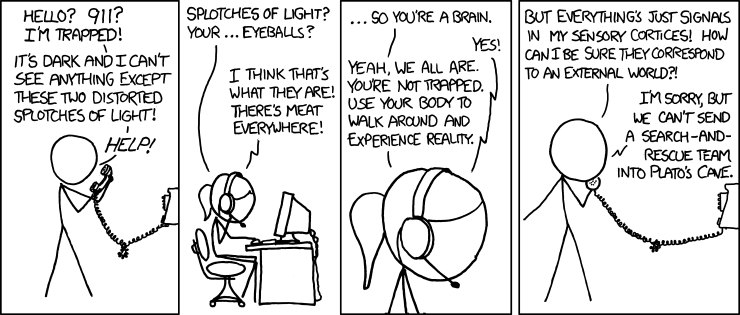“The book” in each of the above statements refers to different things. Yet they seem strikingly interconnected.
The book that arrived in the mail today is Earl Doherty’s Jesus: Neither God Nor Man (thanks, John!)
. “The book” that I was talking about in class today is The Theory and Practice of Oligarchical Collectivism by Emmanuel Goldstein, which is referred to as “the book” in George Orwell’s novel 1984
. A major theme in the novel is the question of whether history exists objectively, or whether everyone believing something to be true makes it true. As I reread 1984, thoughts of creationism and mythicism were inevitable.
That what we call history is our reconstruction of the past, and not the past as it “really was,” is in fact mainstream scholarship and not a fringe viewpoint. It is the use of this to justify rejecting mainstream scholarship that shifts one from the scholarly realm to the fringe – as though because there is room for uncertainty, it is as likely that bloggers who don’t do scientific research will figure out the truth about evolution as the vast majority of scientists, or that self-published authors with no credentials in history are as likely to correctly reconstruct the past as those whose professional lives are spent studying the evidence we have from a given period in the past.

As James Crossley pointed out in a recent interview, the observation that “we all have presuppositions” is far too regularly treated as though it were a profound insight, and then ignored, as though this observation were sufficient justification for plowing ahead on the basis of one’s own assumptions.
This connects with the last point I hinted at in the first paragraph, but as this post is growing increasingly long, I will leave that last point for my next blog entry. For the present, let me just as the most fundamental question: how do we know when to trust experts, or the collective judgment of society, over our own instincts and opinions? Most of us deeply desire to believe that there is objective truth, and that sanity or delusion is not merely whatever society says it is. Yet we all are prone to delusion, and as human beings are resistant to believing that we are ourselves deluded: although we see clearly how others are led astray by their presuppositions, we are inevitably confident that the same is not true in our case. Critical scholarship in fact represents the attempt to overcome this tendency and introduce rigor and as much objectivity as possible into considerations. How effective is the scientific method or critical scholarship at accomplishing this? Are there points at which you disagree with most experts about something? Do you ever justify this by saying “everyone has presuppositions”?
 |
| HT John Wilkins |













